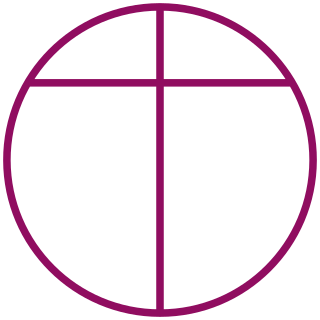
Opus Dei was founded in Spain in 1928 by Catholic priest Josemaría Escrivá. Its stated mission is to help its lay and clerical members to seek Christian perfection in their everyday occupations and within their societies. Opus Dei has long attracted significant controversy regarding its political activities and its alleged cult-like practices.

A prelate is a high-ranking member of the Christian clergy who is an ordinary or who ranks in precedence with ordinaries. The word derives from the Latin praelatus, the past participle of praeferre, which means 'carry before', 'be set above or over' or 'prefer'; hence, a prelate is one set over others.
Personal prelature is a canonical structure of the Catholic Church which comprises a prelate, clergy and laity who undertake specific pastoral activities. The first personal prelature is Opus Dei. Personal prelatures, similar to dioceses and military ordinariates, were originally under the governance of the Vatican's Congregation for Bishops. Since 4 August 2022, personal prelatures have instead been governed under the Dicastery for the Clergy. Personal prelatures are composed of lay people served by their own secular clergy and prelate. Unlike dioceses, which cover territories, personal prelatures—like military ordinariates—take charge of persons as regards some objectives regardless of where they live.

The Catholic Church in Peru is part of the worldwide Catholic Church, under the spiritual leadership of the Pope, the curia in Rome, and the Peruvian Episcopal Conference.
Luis Fernando Figari Rodrigo is a Peruvian Catholic layman, the founder and former superior general of Sodalitium Christianae Vitae. He also founded the Christian Life Movement and several other religious associations.
The Christian Life Movement is a lay ecclesial movement, founded in 1985, in Peru. At that time, a number of initiatives from members of the Sodalitium Christianae Vitae had already begun. Luis Fernando Figari, the Founder of the Sodalitium, conceived the idea of gathering those people and initiatives together in an ecclesiastic movement. The Christian Life Movement forms part of the Sodalit Family, which shares a common spirituality, called the Sodalit spirituality.
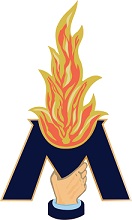
Sodalitium Christianae Vitae (SCV), or Sodalitium of Christian Life is a Society of Apostolic Life of Pontifical Right. It was founded in Lima, Peru, by Luis Fernando Figari on 8 December 1971. It acquired its present canonical form when Pope John Paul II gave his Pontifical approval on 8 July 1997. The Sodalitium was the first male religious society in Peru to receive papal approval. By 1997, there were Sodalit communities in several countries.
A territorial prelate is, in Catholic usage, a prelate whose geographic jurisdiction, called territorial prelature, generally does not belong to any diocese and is considered a particular church.

Pere Casaldàliga i Pla, known in Portuguese as Pedro Casaldáliga, was a Spanish-born Brazilian prelate of the Catholic Church who led the Territorial Prelature of São Félix, Brazil, from 1970 to 2005. A bishop since 1971, Casaldàliga was one of the best-known exponents of liberation theology. He received numerous awards, including the Catalonia International Prize in 2006. He was a forceful advocate in support of indigenous peoples and published several volumes of poetry.
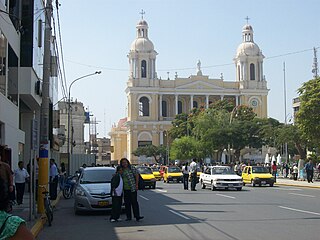
The Roman Catholic Diocese of Chiclayo is a Latin Catholic suffragan diocese in the ecclesiastical province of Piura in Peru's northwestern Lambayeque region.
The Territorial Prelature of Chota is a Roman Catholic territorial prelature, an administrative division not within a diocese, located in the city of Chota in the ecclesiastical province of Piura in Peru.
The Peruvian Episcopal Conference is an episcopal conference of the Roman Catholic Church of Peru that gathers the bishops of the country in order to discuss pastoral issues and in general all matters that have to do with the Church.
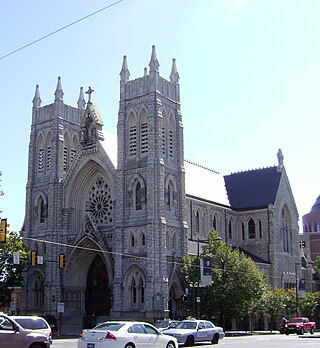
St. Agatha–St. James Church is a Roman Catholic church in Philadelphia, Pennsylvania, established in 1850. As the first Roman Catholic parish in Philadelphia west of the Schuylkil River, St. Agatha-St. James Church is the mother church of West Philadelphia. Originally, a small church dedicated to St James the Greater was constructed in an open field at 38th and Chestnut Streets, but with the rapid influx of Catholics into the area, particularly from Ireland, the decision was made to build a larger church on the same land. Construction of the current building, designed by Philadelphia architect Edwin Forrest Durang, began on October 16, 1881 and was completed on the same day in 1887. The hand-carved wooden confessionals from the original 1850 church were placed in the new building and remain to this day.
The Catholic sexual abuse scandal in Latin America is a significant part of the series of Catholic sex abuse cases.

Toribio Ticona Porco is a Bolivian prelate of the Catholic Church. He was Prelate of the Territorial Prelature of Corocoro from 1992 to 2012 after serving as Auxiliary Bishop of Potosí from 1986 to 1992. Pope Francis made him a cardinal on 28 June 2018.

Luis Fernando Intriago Páez is a secularized priest from Guayaquil, Ecuador. He was parish priest of the Church of Our Lady of Czestochowa from 1996 to 2013. Intriago was dismissed from his priestly functions by the Archdiocese of Guayaquil after there were complaints that Intriago sexually abused and tortured minors. Intriago told his victims that to help themselves and their families, they needed to suffer through a secret sacrifice, which he named the dynamic of sin. The Catholic Church does not approve such rituals.
Marco Antonio Órdenes Fernández is a native of Chile and a former prelate of the Catholic Church. He was Bishop of Iquique from 2006 to 2012. When appointed at the age of 42, he was the youngest bishop in the history of Chile. Accusations that he had sexually abused minors forced his resignation in 2012. Civil procedures concluded when prosecutors could not establish a case against him, but church proceedings ended with his removal from the clerical state in 2018.

José Antonio Eguren Anselmi is a Peruvian prelate of the Catholic Church who was Archbishop of Piura from 2006 to 2024. He was Auxiliary Bishop of Lima from 2002 to 2006.
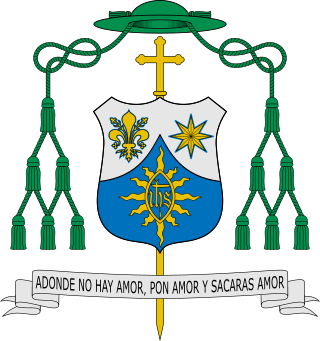
Alberto Arturo Figueroa Morales is a Puerto Rican prelate of the Catholic Church. He has been bishop of the Diocese of Arecibo in Puerto Rico since 2022. He served as an auxiliary bishop of the Archdiocese of San Juan in Puerto Rico from 2019 to 2022.

Alberto de Belaúnde de Cárdenas is a Peruvian lawyer, LGBT activist, and politician. An independent progressive caucusing with the Purple Party, he currently serves in the Peruvian Congress' complementary term 2020–2021. He previously served in the 2016–2019 term, elected under Peruvians for Change, and subsequently joining the progressive Liberal Bench.











